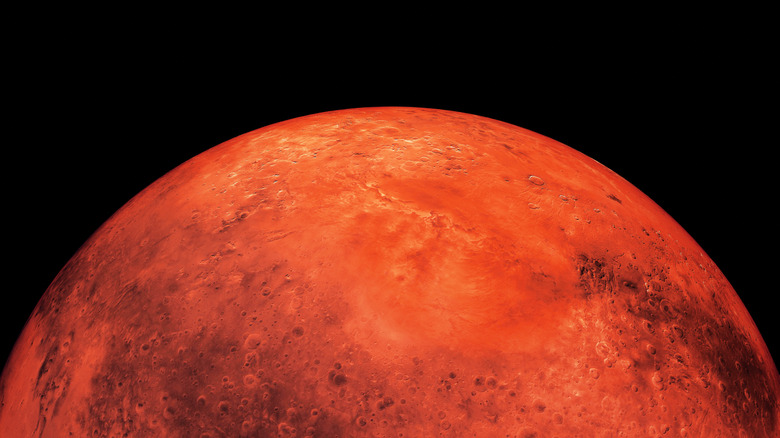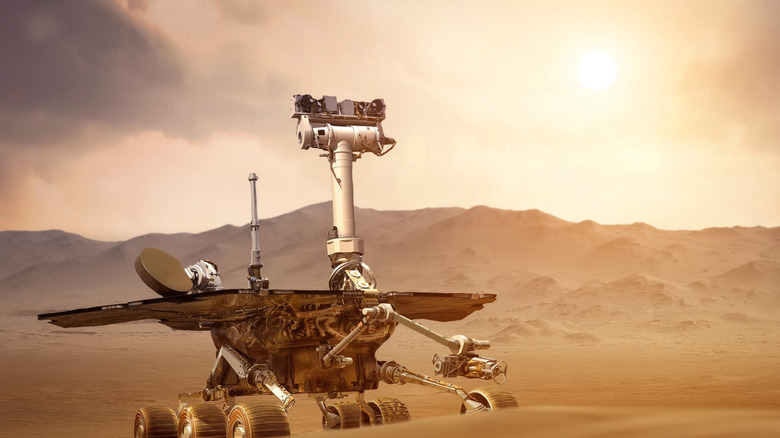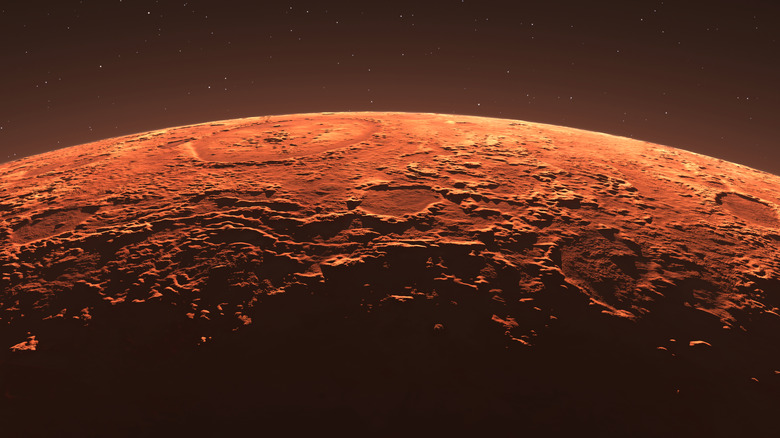Here's What Your Voice Would Sound Like On Mars
NASA has long been interested in Mars as it represents one of the few places in our solar system where life could have existed. But that doesn't mean we can just travel there and be ok. The planet has a very thin atmosphere and a harsh, dusty, and cold landscape complete with polar ice caps (it actually snows on Mars, though differently to how it snows on Earth) and extinct volcanoes.
If we were to stand on the surface of Mars without a spacesuit, it would be an experience nothing short of horrific. Not only does the temperature of the red planet get as low as -225 degrees Fahrenheit, the surface is frequently engulfed in sandstorms that can cause dust to swirl in the air for months. That's to say nothing of the fact that Mars has just one third the gravity of Earth and an atmosphere so thin that there simply isn't enough oxygen for us to breathe. The red planet has small amounts of oxygen in its atmosphere, around 1/10,000th of Earth, meaning that we couldn't survive by just standing on the surface.
With that out of the way, we can start to see how everyday activities, like having a conversation, on Mars are very much hypotheticals. Still, it's interesting to think about how our voices might sound on an alien planet, and given everything we already know about how strange an experience it would be to traverse the surface of Mars, you might think we would sound entirely different to how we do on Earth — and you'd be sort of right.
We would sound a lot quieter on Mars
In 2020, NASA sent a rover to Mars to search for signs of ancient microbial life. The Perseverance rover has since collected core samples of Martian rock for future study, but it's also equipped with two microphones. These microphones allow us to listen directly to the surface of Mars for the first time, revealing a soundscape that has gone unheard since the dawn of humankind. Based on what's been discovered so far we have a much better idea of how we might sound on the surface of Mars.
According to NASA, our voices would be quieter and more muffled on Mars than we're accustomed to on our home planet. That's due to the fact that the Martian atmosphere is roughly 100 times less dense than on Earth. Sound itself is essentially vibration, which occurs when waves of pressure travel through air to reach our ears. These sound waves can also travel through liquids and solids, but on Mars, the atmosphere is so thin there's very little for the sound waves to actually travel through, resulting in weaker, lower volume audio.
In a 2021 study published in Nature, a team of researchers looked at the first sound recordings of Mars taken by the Perseverance rover to reveal the unique acoustic properties of the Martian atmosphere. The team used the sound of a laser attached to the rover, which was fired at nearby rocks to create a zap sound. After analyzing recordings of the audio, scientists confirmed that sound doesn't carry very well on Mars. What's more, different frequencies actually travel at different speeds. High-pitched sounds were found to travel at around 250 meters per second or 559 mph while low-pitched sounds travelled at 240 meters per second, or 537 mph.
High pitched sounds are mostly inaudible on Mars
The biggest difference in terms of what we would be able to hear on Mars has to do with this important distinction between high- and low-pitched sounds. We know there's a difference in the way high and low sounds travel on Mars, but any sound higher than most voices — such as whistles, bells, or even some bird songs — would be basically inaudible. This has to do with the atmosphere of Mars being made up of 96% carbon dioxide, which absorbs many higher-pitched sounds.
It's also worth noting that sound in general would take slightly longer to reach our ears on the surface of the red planet. The planet's average surface temperature is around -81 degrees Fahrenheit which also affects the speed at which sound travels. As the Nature study showed, on Mars, sound moves at between 537 and 559 mph depending on the frequencies, whereas on Earth, sound moves at 760 mph. As such, our voices might take slightly longer to reach our ears, though it would likely be imperceptible, and only noticeable were we listening to someone else at a distance.
Put simply, then, we would sound a lot quieter and more muffled were we to speak on the surface of Mars. But we'd also be unable to hear certain high frequencies and would likely be incapable of having any conversations over any considerable distance.


